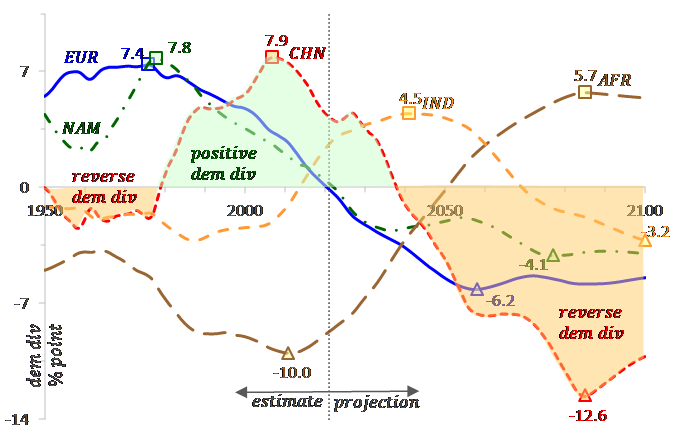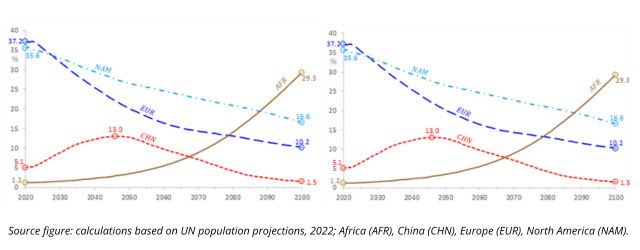Global shifts in income and trade: developments until 2100
| Date: | 05 June 2024 |

Demographic developments are at the heart of major transition processes facing countries worldwide. The recent negotiations for a new cabinet in the Netherlands also testified to this. Limiting asylum migration seems to have been at the heart of these negotiations. Recently, two interesting reports on demographic trends were published. Major demographic changes are taking place on a global scale, but these reports and further current discussions on migration and demography, on the other hand, have a strong national focus, argue Professor Steven Brakman (UG), Associate Professor Tristan Kohl (UG) and Professor Charles van Marrewijk (Utrecht University).
Lees hier de Nederlandse versie van dit blogartikel.
De Staatscommissie Demografische Ontwikkelingen (The State Commission Demographic Developments) 2050, gives a broad outline of what demographic developments mean for economic growth, social spending, education, housing and care, among other things. In a recent report, The Netherlands Bureau for Economic Policy Analysis (CPB) shows that migration is mainly linked to labour market developments; the tighter the labour market, the greater the immigration. What is striking about the discussions held in the Netherlands is their strong national focus, while demographic developments largely take place on a global scale. While the State Commission does pay some attention to international developments, this mainly concerns the debate in the 1970s about limits to growth. These limits would, according to economists Jan Pen and Jan Tinbergen for example, put a limit on the size of the global population.
Demographic dividend
Major global demographic transitions await us this century, which will cause a major shift in the global economic balance of power. There will be large regional shifts in income, and associated shifts in international trade. This is mainly determined by the share of the working population - the productive part of the population - in the total population. This is referred to as the demographic dividend. According to the United Nations (UN), the global working-age population (as a percentage) peaked in 2010 and then started a sharp downward trend. However, this overall trend masks important regional differences. Europe, China and North America in particular are ageing, while Africa and parts of Asia are rejuvenating. The figure below (Figure 1) shows the evolution of the demographic dividend for a number of regions calculated by Brakman, Kohl and Van Marrewijk, using UN population projections.

For China, it appears that until roughly the middle of this century, the demographic dividend is positive relative to the world population, and then becomes strongly negative. This trend also occurs for Europe and North America. Africa, on the other hand, is rejuvenating; the demographic dividend will become strongly positive. What does this mean for global income and trade developments? Brakman, Kohl and Van Marrewijk calculated this by drawing on historical experience.
Income and trade
What is the historical relationship between a country’s demographic dividend and its income? And subsequently, what is the effect of these income shifts on a country's trade position? Brakman, Kohl and Van Marrewijk statistically establish the relationship between demographic dividend and income, and between income and trade. The two figures below show the results: on the left the shifts in income and on the right the trade effects. Income by region is shown as a percentage of the total global income, and trade by region as a percentage of global trade.

Trades shares of China, Europe and North America will decline
A few observations stand out. China's share of world income and trade will sharply decline. China's share in the global trade is expected to decline to 1.5 per cent. By 2100, China's share in the world trade is probably even smaller than that of Latin America (not shown in the figure). Europe and North America also face major changes. While these regions are currently dominant in terms of their share of world income and trade (around 70 per cent of total global trade), by 2100 these regions will have lost this position to Africa and parts of Asia in particular. The combined trade share of Europe and North America is expected to have declined to about 25 per cent by then.
Developments in global demographics will not only affect the structure of the world economy, but will also cause geopolitical shifts, according to Brakman, Kohl and Van Marrewijk. Changes in economic power relations will have to follow, they argue; think of the currently still dominant position of Europe and the United States in the World Bank and the International Monetary Fund (IMF) and the position of the dollar as an international reserve currency. These dominant positions in the status quo will be firmly challenged. But China, which is currently seeking to increase its ‘rightful’ position on the global economic stage, will also face a sharply diminished economic influence after 2050. In this regard, China needs to hurry.
References
https://www.staatscommissie2050.nl/
https://www.cpb.nl/economische-dynamiek-en-migratie
https://population.un.org/wpp/
Questions? Please contact Steven Brakman or Tristan Kohl.

